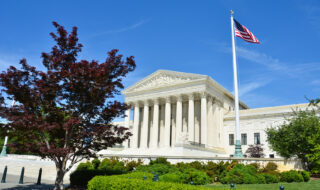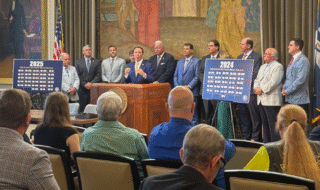April 15, 2024 Last Edit: July 25, 2024
From your small-business-advocacy team in Sacramento
Welcome to the April 15-19 edition of the NFIB California Main Street Minute from your small-business-advocacy team in Sacramento.
State Budget Update
- For those keeping tabs on the state budget deficit, and NFIB has its eagle eyes and talons out for any attempt to stiff small businesses with the tab for the legislative profligacy that has us swimming in red ink, the Legislature last week chopped $17 billion from planned spending.
- “The true size of the deficit has been difficult to pin down, reports the Associated Press. “In January, Newsom insisted it was about $38 billion. But the nonpartisan Legislative Analyst’s Office said it was actually $58 billion because Newsom didn’t include some reductions in public education spending. Then in February — after state revenues continued to come in below expectations — the LAO revised its estimate to as much as $73 billion.
— “State budgets across the country have tightened as economic growth has slowed and states have exhausted the billions of dollars in aid from the federal government during the coronavirus pandemic. The problem is more pronounced in California, where the budget is easily the largest in the country — and in fact the state’s economy is bigger than most countries.
— “… Newsom won’t announce an updated deficit number until next month, after Californians have filed their tax returns and state officials have a better idea of how much money they have. Thursday’s vote in the state Legislature means Newsom can announce a number that will be much smaller than it would have been. The $17 billion in reductions lawmakers approved Thursday, combined with the anticipated withdrawal of about $13 billion from the state’s various savings accounts, means Newsom can already count on reducing about $30 billion of the shortfall.”
Minimum Wage Update
- Where does it stand with progressive financier Joe Sanberg’s November ballot initiative raising the state’s minimum-wage rate to $18 an hour?
- So far, reports Politico, it’s been met with “shrugs from unions and industry coalitions that fiercely fight over the minimum wage levels elsewhere. In a labor market where In-N-Out Burger cashiers make $20 an hour, Long Beach hotel workers earn $23 and medical assistants statewide can soon count on $25, it is hard to find anyone who wants to fight over $18.
— “Across the political spectrum, those used to seeing interest groups cut deals to neutralize ballot initiatives are quietly asking: is Sanberg really planning to plow ahead with his proposal?
— “He says he intends to, but after spending $10 million in 2022 to qualify it for the ballot Sanberg has not raised a dime for the effort in months and recently shut down the ballot committee that was his primary vehicle for influencing the outcome. He says he is now banking on the inherent appeal and clarity of asking voters to give themselves a raise. It is a gamble in a system where ballot measures typically cost tens of millions of dollars to pass, and a test of the electorate’s progressive values at a moment of economic uncertainty.”
- Sanberg has until late June to decide whether to withdraw his initiative or not.
Retail Theft Update
- Last Tuesday (April 9), Assembly Speaker Robert Rivas unveiled a bipartisan package of seven bills aimed at halting the epidemic of retail theft in California. Six of them now have the support of NFIB:|
— AB 1794 (McCarty/Friedman) — Under existing law, if the value of all property taken over the course of distinct but related acts motivated by one intention, general impulse, and plan exceeds $950, those values may be aggregated into a single charge of grand theft. This bill would clarify that those values may be aggregated even though the thefts occurred in different places or from different victims.
— AB 1779 (Irwin) — This bill would no longer limit the jurisdictional rules for … criminal actions brought by the Attorney General.
— AB 1960 (Soria) — This bill would create sentencing enhancements for taking, damaging, or destroying property in the commission or attempted commission of a felony.
— AB 1972 (Alanis) — This bill would expand that crime [organized retail theft] to include merchandise stolen from a merchant’s cargo.
— AB 2943 (Zbur/Rivas) — Existing law authorizes a person to be charged with grand theft if the property taken exceeds $950 over the course of distinct but related acts. This bill would clarify that those related acts include acts committed against multiple victims or in counties other than the county of the current offense.
— AB 3209 (Berman/Rivas) — This bill would authorize a court, when sentencing a person for an offense involving theft from a retail establishment, vandalism of a retail establishment, or battery of an employee of a retail establishment, to issue a criminal protective order prohibiting a person from entering the retail establishment, including any parking lots and including other franchise or chain locations of the retail establishment, as specified.
- None of the measures lowers the felony thresholds back to their pre-Prop. 47 levels, which NFIB has campaigned for, but they should be of some help.
- “It remains to be seen whether Gov. Gavin Newsom, Rivas and Senate President Pro Tem Mike McGuire, D-Healdsburg will negotiate a deal with ballot measure proponents that prompts them to drop the initiative,” reports The Sacramento Bee.
- “McGuire and Newsom have been clear that they do not want to take retail theft to the ballot or make changes to Proposition 47. Rivas on Tuesday echoed this sentiment. ‘I believe legislation that would require going to the ballot to address retail crime or theft is not necessary,’ Rivas said in a statement. ‘The Assembly’s bipartisan and comprehensive plan delivers real and urgent changes for Californians.’”
- The above six bills, along with all the other legislation NFIB is tracking can be found in this updated bill list.
NFIB California in the News
- Last week, NFIB California State Director John Kabateck was interviewed twice by the California Insider Show on Epoch TV. In one interview, he discusses the negative effects the state’s new minimum-wage rate for fast-food workers is having on small-business owners and franchisees. In the second interview, Kabateck gives his views on California’s ever-increasing rules and regulations.
- Kabateck was also quoted in The Center Square about the pressure small-business owners are facing as a result of California’s new minimum-wage law for fast-food employees.
- NFIB California also sent out a news release, April 9, commenting of the latest NFIB Optimism Index findings and on the American Legislative Exchange Council’s ranking us 47th in the nation in economic outlook in its latest Rich States, Poor States
- The NFIB California in the News 2024 story has been updated with a sampling of the latest media mentions.
Calendar
- May revise of the governor’s 2024-2025 proposed state budget. Date TBD
- May 24 deadline for bills to pass their house of origin (Assembly, Senate)
- June 15, midnight, constitutional deadline to pass 2024-2025 state budget
- June 27 deadline for ballot measure to qualify for November
- August 31 deadline for bills to have passed Legislature and sent to governor
- September 30 deadline for governor to sign bills into law
- November 5, General Election Day
National
Highlights from NFIB Legislative Program Manager Caitlin Lanzara’s weekly report
- On April 11, NFIB-WV Member Michael Ervin, founder of Coal River Coffee Company, testified before the U.S. House Committee on Ways and Means in a hearing titled, “Expanding on the Success of the 2017 Tax Relief to Help Hardworking Americans.”
- On April 12, the U.S. Supreme Court upheld Fifth Amendment rights for small businesses in Sheetz v. County of El Dorado, California. In this case, a California property owner sought to build a manufactured house on his land and obtain the necessary permit. In exchange for the permit, the County imposed a monetary exaction over $23,000 in order to finance road improvements in the county. Because the exaction was authorized by legislation, lower courts held that it was not an unconstitutional condition. NFIB filed an amicus brief.
Next Main Street Minute April 22.
NFIB is a member-driven organization advocating on behalf of small and independent businesses nationwide.
Related Articles














